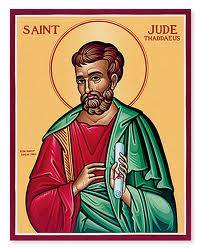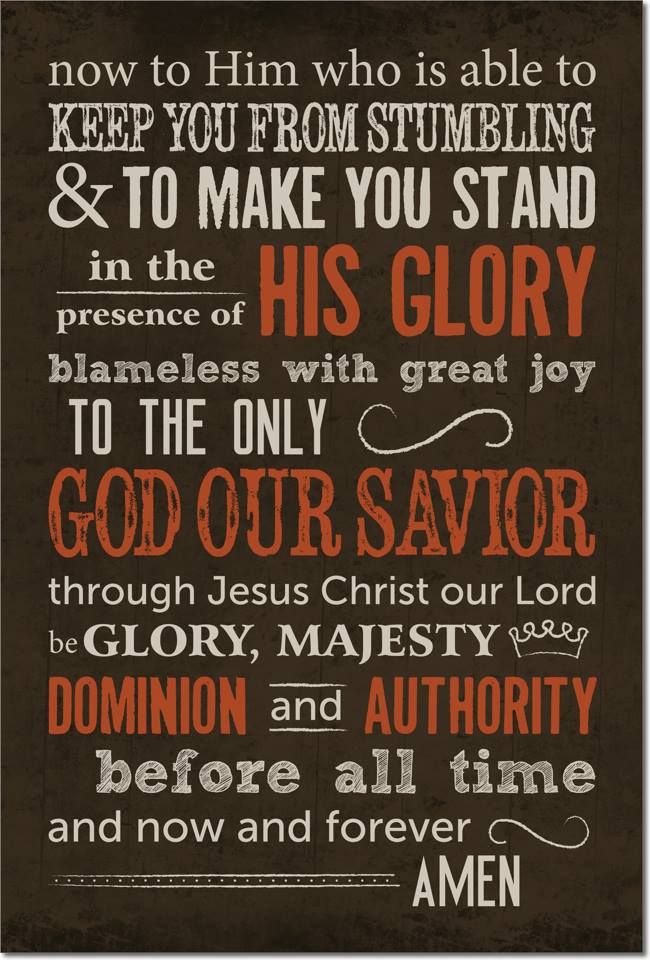 Jude, Judah, Judas, Thaddeus ~ this man was one of the Twelve, a New Testament author, and is the patron saint of desperate cases (given his unfortunate name-sharing with the infamous traitor). Tradition recounts that Jude gathered the Lord’s burial cloth and brought it to Turkey, then traveled to Armenia, whose Church Rite can be traced to the Saint. He continued moving and preaching and was eventually joined by Simon (who is also honored this feast day). They were both martyred in Persia. This man was a missionary from the get-go, asking Jesus during the Last Supper, “Why reveal Yourself just to us and not the whole world?” He was already thinking about “the whole world.” Jesus explained that all who love Him and are true to His Word will be loved by the Father and filled with the Spirit (John 14:22-3).
Jude, Judah, Judas, Thaddeus ~ this man was one of the Twelve, a New Testament author, and is the patron saint of desperate cases (given his unfortunate name-sharing with the infamous traitor). Tradition recounts that Jude gathered the Lord’s burial cloth and brought it to Turkey, then traveled to Armenia, whose Church Rite can be traced to the Saint. He continued moving and preaching and was eventually joined by Simon (who is also honored this feast day). They were both martyred in Persia. This man was a missionary from the get-go, asking Jesus during the Last Supper, “Why reveal Yourself just to us and not the whole world?” He was already thinking about “the whole world.” Jesus explained that all who love Him and are true to His Word will be loved by the Father and filled with the Spirit (John 14:22-3).
His short book of twenty-four verses is a warning to be watchful and wise in dealing with false teachers, whom he unexpectedly describes with passionate poetry in verses 12-13. His audience was thoroughly Jewish, for he expected them to be familiar with references Biblical (verses 5-7, 11), apocryphal (verses 9, 14-15), and apostolic (verses 17-18). He presented them with practical, real advice:
Fight (3),
Remember (17),
Learn ( 20),
Pray (20),
Wait (21),
Convince (22),
Save and snatch (23).
And he blessed them with an oft-memorized, inspiring benediction:
“Now to Him Who is able to keep you from falling and to present you without blemish before the presence of His glory with rejoicing; to the only God our Savior through Jesus Christ our Lord be glory, majesty, dominion, and authority before all time, now and forever. Amen”
Breathe that in. Now, where’s the fight?
Dear Saint Jude, pray for us!

Apologetics notes:
1.) Jude refers to himself as a servant of Jesus and brother of James, a well-known church leader in Jerusalem. They are kin to Jesus. Here is an excellent explanation of the familial language.
2.) Although the book was listed in the Muratorian fragment of the second century as acceptable for reading, it continued being disputed for 200 years until the Carthage councils included it in the final canon. This is the New Testament we all know and love, including our separated brethren.
3.) Verse 23 calls on believers to “save some,” proving that people do co-operate with God in salvation. This does not lessen God’s power and glory; He does the saving (and healing and forgiving and prayer-listening, etc). We work with Him. Consider also Colossians 1:24, James 5:16, and John 20:23.
